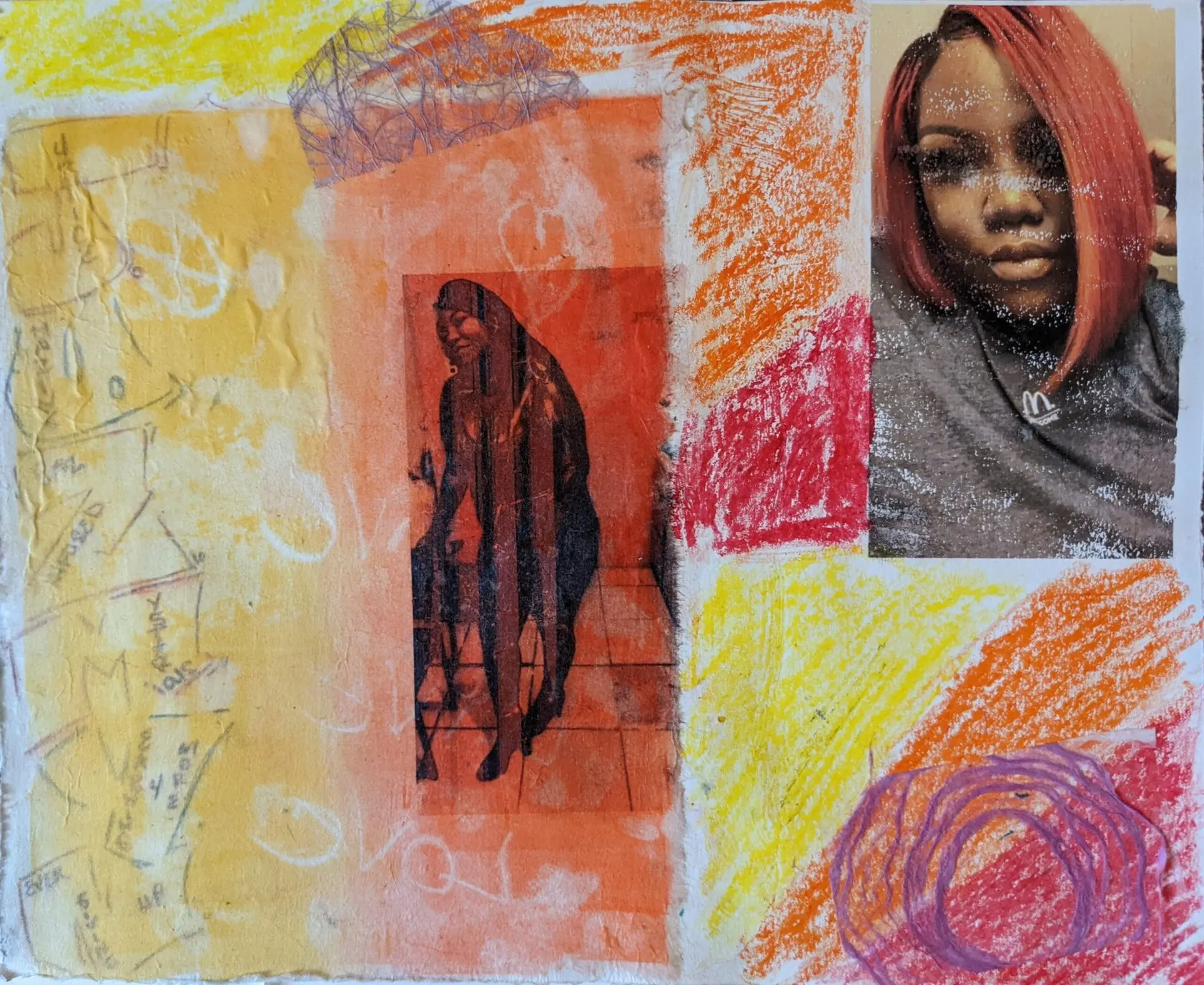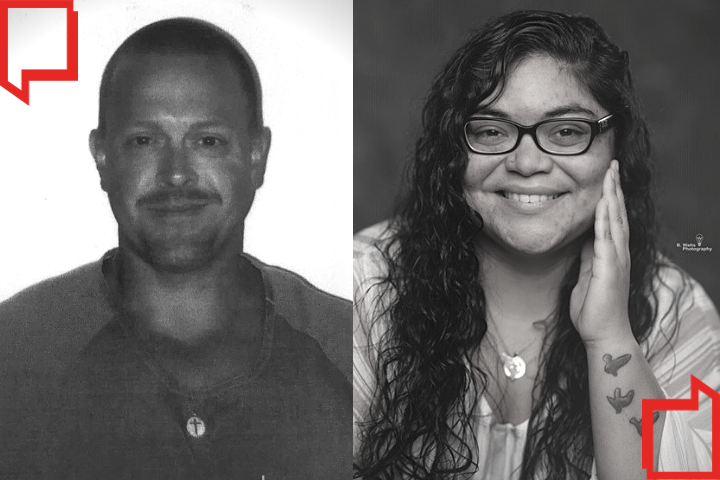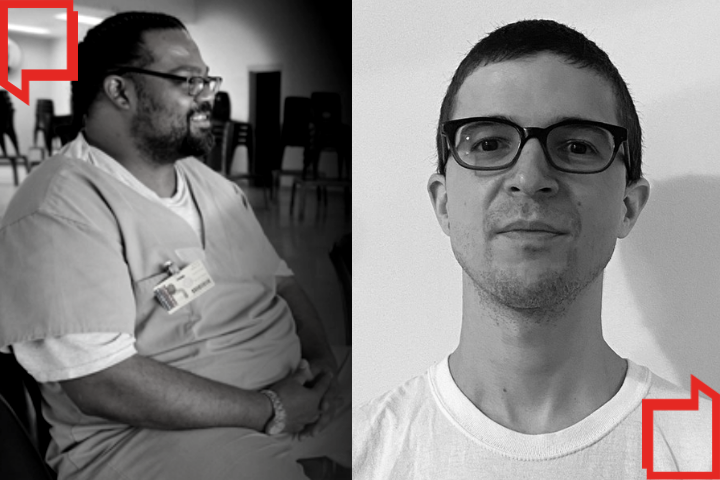Steven Perez was awarded the Fielding Dawson Prize in Nonfiction Memoir in the 2022 Prison Writing Contest.
Every year, hundreds of imprisoned people from around the country submit poetry, fiction, nonfiction, and dramatic works to PEN America’s Prison Writing Contest, one of the few outlets of free expression for the country’s incarcerated population.
I remember my grandmother dying on a hospital bed. I can still hear the life support machine beeping. The smell of antiseptics permeated the hospital. It was the year 2000. I was twenty-one.
She had a fistful of tubes connected to her body. One came out of her mouth from inside her lungs. It was as thick as a quarter is round. She had all kinds of smaller tubes poked into her veins and connected to an IV. She fought hard.
I think about this all the time. My worst fear is that my mother will have to go through that without me there with her. While I’m in here. In prison. She doesn’t deserve that.
I remember how much Mom loved my grandmother. Every house we moved to, Mom had Grandma there with us. Mom would give Grandma her insulin shots every day. She’d take Grandma to Mass every Sunday. Ever since I was a little boy.
I remember when I was twelve I went crabbing with my friend Nat and his father. His father had a square cage big enough to fit a chihuahua into.
We filled the cage with slimy raw chicken then lowered it into Nueces Bay with a rope from the top of a bridge. We left it there all day, and when we came back, we pulled it up. The crabs were all over the inside of the cage. Nat’s dad boiled them with Zatarin’s cajun mix in a towering pot. His mom grilled cheeseburgers. We had a feast.
I remember Nat disappeared for a long time. Then one night, I saw him at a nightclub. I asked him where he’d been. He said “I’ve been in prison for eight years.” I said, “Damn. I didn’t even know that.”
I remember I wept at my arraignment hearing. The gasping. The panting. The sniffles. The tears. The snot. It’s not a good thing that I was the only one there besides Mom, the prosecutors, my lawyer, and the judge.
I feel like such a pussy. But I was accused of murdering a man that I didn’t murder. And I couldn’t make bail because the U.S. Marshals lodged a detainer on me and said I had no bail for it. What else could I do but cry?
My lawyer took me in a room with a long, glossy, cherry wood table with thirteen chairs around it. I sat in one of them. He stood there and said, “You shouldn’t have told them shit. You see that fat fuck out there? He wants to convict you.”
I asked him, “How much would it cost for me to get this murder charge dropped?” He said, “About a quarter mil.”
I remember when I first met my lawyer. It was a small room in the jail with a glass between us. He said, “Did they tell you about the law of parties?”
I remember the look of satisfaction on the judge’s face when she read the jury’s sixty-year verdict. It was one of her first trials as a judge.
She directed my jury to convict me of murder under the law of parties if the judge found my codefendant committed murder, that I knew of his intent to commit murder, and that I acted with intent to promote or assist the commission of a murder by aiding.
I remember years later in the prison law library that that is not the law of parties.
I remember my Uncle Homer teaching me how to ride a horse. A city boy like me couldn’t comprehend the beauty of the ride. Smantha was the horse’s name. She was blond. And she wasn’t all the way broken. I wasn’t even in middle school yet.
Samantha wasn’t feeling it. She ran in circles with me on her back. Uncle Homer stood five foot five in the middle and held on tight to the rope around her neck. “Wo! Wo! Wo!” he hollered. Samantha started bucking. I jumped off. Uncle Home let go of the rope. Samantha took off sprinting as fast as she could on the edge of the fence line around the property where the stables stood.
Uncle Homer signed in relief. His baseball cap and black mustache. He laughed at my quick thinking and asked, “Are you okay?”
I remember coming back to the jail after sentencing. The jailers placed me in a holding cell, on suicide watch overnight. I called home and sang a hymn to my seven-year-old girl, Serenity. “Jesus loves you this I know…for the Bible tells me so…” HS started to cry, and as she gave the home to her mother, her tinny voice cracked and cringed. Her birthday was in three days. She said, “I want him.” I want you too Baby Girl.
I remember cheating on her mother, Iris, when we were married, with her best friend. Serenity was eight months old. I was twenty-two. Iris was nineteen. That was one of the worst things I’ve ever done.
Years later, when I was in federal prison, Iris somehow forced a confession outta me. That was one of the stupidest things I’ve ever done. To this day, I still tell her I’m sorry.
I remember the day I signed the divorce papers. I had just been released from federal prison. She told me that she and John C., one of my drug dealing partners, had sex while I was locked up. She said, “Call him. Ask him.” He was with his wife when I called him. He said, “She’s lying.”
I remember moving in with Uncle Homer when I was seventeen. One night he came home drunk, and started crying to me, telling me how much he loved me, and how much I meant to him. He hasn’t written to me. Not one time since I got locked up on this case fifteen years ago.
I remember when Iris visited me in Beaumont in federal prison back in 2004. She looked so beautiful that all the prisoners at visit kept staring at her. She had highlights in her golden brown hair. Her skin matched the blond highlights. She wore fitted jeans, thong sandals, and a blouse with mixed browns and yellows. I didn’t know it then, but she was already in an intimate relationship with some dude who owned a bar in Houston.
I remember she came and visited me in state prison and confessed that she’d been smoking meth for five years. She had just got outta rehab. She was a thick hundred sixty-eight pounds. Still dazzling. She was wearing open-toed high heels. A month later she weighed ninety pounds. That’s what meth does to you.
I remember she came to visit again after she lost all that weight. She didn’t get here till twenty-five before the close of visitation. She stood up when I walked into the visitation room.
She was fidgeting and lethargic. She had set up all kinds of snacks from the vending machines on the table for me to eat, as if she felt that was the closest thing she could give me to a meal she wanted to cook for me. She didn’t eat.
She smiled as she stood waiting for me to come to the table. The woman officer, who had known me for several years by then, gave Iris a stink face and started to chastise her, as if she wanted to run her off.
I remember when Iris noticed the officer staring her down. She stood between me and the officer and said, “I had a blowout on the way over here, and I couldn’t find anyone to help me.”
She couldn’t keep her eyes open long enough to look sober. Her once captivating body was gone. Her face was aging too soon and shriveling up. The meth was eating her up from the inside out.
I thought about how I could have prevented her addiction by never going to federal prison. I thought about how my greed and selfishness was to blame. But was it really? If probation was available, none of this would’ve happened.
Just before the officer started to run her off, I grabbed her and held on to her, protecting her from the officer. I said, “She’s okay…she’s had a long day. Her truck broke down on the way over here.”
I remember John C. coming to our house begging me to help him sell some of the coke the cartel had loaded him up with. He said, in his pretty-boy Dillard’s getup with his fresh boy-band haircut, “Please Steve. They fronted me seven keys. And that’s more than I can handle. I need your help. I promise I won’t call you asking for money for a whole week. I need your help bro. Come on Steve. I can’t do it without you.”
I remember telling him, “I don’t get dope fronted anymore. I buy cash. And only what I need.” He said, “I know how fast and clean you work. Please help me.”
I felt sorry for him. Because once the cartel starts to load you up, there’s no telling them no. And you better have their money when they call. I said, “I’ll take half a brick only. And don’t bother me for a week.”
I remember him calling me three days later for a payment. “I’m sorry Steve. I know I told you I wouldn’t bother you for a week, but they’re already calling me. You got anything you can pitch in?”
I rushed it for him. And because of that, me trying to look out for John C., trying to help him out of a bind, I went to federal prison for two years.
I remember growing up visiting my father in prison. The parole people made him do twenty-seven years of a thirty-five-year sentence on a murder convidtion despite his flawless record. I was eleven when he went in. I was thirty-eight and in here when they let him out. The deceased victim’s sister and some anonymous politician kept protesting his release. There’s a law in Texas that allows them to do that and those protests are usually what keep us from making parole regardless of what the parole people say and regardless of how much we’ve re-formed our lives.
My father stayed out a year or two, and now he’s back in on parole violation. He couldn’t stand the ankle monitor, which was not part of his plea agreement, and the parole officers wouldn’t let him work or look for work. “I gave them what they wanted,” he told me when I saw him in a cage at a transfer facility. He said he’d rather discharge his thirty-five-year sentence than put up with their bullshit. If I were out, he’d still be out.
I remember when Iris got sent to state prison. She and I talked on the phone. She called her mom. I called my mom. And my mom and her mom were at my mom’s house. They put us on speakerphone and let us talk to each other.
I remember my heart dropped. She told me that some dude attacked her so she stabbed him.
I remember telling her in letters over and over how sorry I was for going to federal prison and selling our house. She would say, “You don’t have to keep apologizing to me. It’s alright. I forgive you.”
I remember her telling me she was gonna help me pay for a lawyer to get me outta here when she got out. Instead she fell in love with some dude who ended up leaving her for his ex.
I remember she got pregnant before she went to prison. SHe wanted to have an abortion because she didn’t want me to know she was pregantn. My mother told her, “Why would you do that? Don’t do that.” She said, “I don’t want Steve to know I’m pregnant.” Mom said, “Steve don’t even believe in abortions.” She gave birth to a precious baby girl, Isabella. Bella, or Belly, for short.
I remember Bella was three years old struggling with Serenity for the phone then asking me, “Will you be my dad?” She had told Serenity, “Give me the phone! Give me the phone!” Tears welled from my eyes. “Yes, if you want me too.” And last month, she came to visit me with Serenity and Mom. After six years of listening to her tinny voice on the phone, I was finally able to carry her in my arms.
When I picked her up and held her, she said into my ear, “Love you.” I held their hands the entire visit.
I remember Mom telling me Bella saw a picture of Mom with Serenity at church together when Serenity was a toddler. Bella said, “Gamma Rosie. Gamma Rosie. That’s me.” Mom said, “No. That’s sister.” “No Gamma. That’s me.”
I remember Iris telling me in a letter that Bella’s dad was here at this prison. I wrote back. “If he is, he’s in seg.”
He’s in one of the prison gangs that prison administration never lets out of seg. “Seg” is short for “administrative segregation. That means solitary confinement for life or until you make parole or discharge your sentence. By the time you get outta there, if you ever get outta there, there’s a good chance you’ll be broken to make it in the free world. It’s a good thing he was only a nine-year sentence. He should be getting out soon.
Iris said he does want to be a part of Bella’s life. Hopefully that turns out well.
I remember rumors in 2009 about a cut in hot meals here in state prison. I didn’t believe the rumors until I started living it not much after the rumors started. We went from three hot meals a day to no hot meals a day in a matter of months. Here we are twelve years later, and we’re still getting cut short on our hot meals. Just yesterday, we got only one hot meal.
The problem is that Texas prisons cannot keep enough officers to run these prisons. No matter what they try to do to persuade people in the free world to come work down here, no matter how much money they offer them, it doesn’t work. They can’t keep these prisons adequately staffed.
Judges and prosecutors mass produce prisoner at an alarming rate, when they violate our rights to put us here with all this time, they hardly ever acknowledge the violation or correct it, and the Texas legislature refuses to give us so-called violent offenders our earned good time and work tim until we serve half our sentence or thirty years, whichever is less.
I remember looking at my first time sheet and wondering why it said I was earning good time and work time when, in fact, it doesn’t even count. Discharge date: 2067.
I remember when I was four my father beat up my mother so badly that he broke her nose and gave her two black eyes. You can still see the bone protruding between her eyes. I kept yelling at him to stop. I stood in front of her and cried. He left.
I remember a year later, he told Mom and me he was leaving us. Then came the divorce. Mom and I moved to Huston and lived with my Aunt Terry and my cousins John Paul and David for a few months. Aunt Terry was a phlebotomist, and my cousins had it made. They lived in a nice apartment with all the best Transformers. We went swimming.
I remember the year after that, Aunt Terry had the nervous breakdown. Then came hospitalizations and the shock treatments. First it was schizophrenia, then bipolar schizophrenia, now dementia from all the medicines. John and David would stay with us.
Aunt Terry cries to me on the phone telling me how much she misses me, how bad she wants me home, how David and John hardly go spend time with ehr, how John tells her to stop blowin’ up his phone. We pray together on the phone for the Lord to grant all her heart’s desires and bring me home to her soon. She sings to me. Stevie Wonder. “I just called…to say…I love you. And I mean it from the bottom of my heart.”
I remember when COVID-19 hit. Quarantine lockdowns. No hot trays. Prisoners and officers dying. Faces covered with masks. No more Mass. Riots all over the world. Even on the other side of the world. It’s a new way of life in prison and out of prison. Still no relief from the legislators or the courts.
I remember Iris singing to me and Serenity in the car while I was driving. Serenity in the middle of the backseat in her car seat wrestling with her empty bottle. Griping for more. For Momma to stop. You’re irritating me was the look on her face through the rearview mirror as she reached her arms toward Momma. Her light brown skin. Her black button eyes. Her black hair pulled tight into a bow. She couldn’t climb out because she was strapped in. Mariah Carey on the speakers. “You will always be my baby.” I wanted that moment to last forever.
Then one day, five years later, Mom called and left a message on my cell phone. “Son, robbery-homicide just left from here. They were looking for you. They’re on their way to your apartment.”
I remember, the day after the shooting, driving on Saratoga Boulevard in my black Cadillac. I took a left on Rodd Field Road. Another left on Nile. I turned into the neighborhood and pulled up at my friend Rudy’s house.
Rudy and his father-in-law were unloading two-by-fours from the bed of Rudy’s truck. I didn’t know it, but eight cop cars were on my ass. As soon as I got out of the car, white cops swarmed around me with guns drawn. “Put your hands up!” They slammed me on the ground. The soft, cold grass on the side of my face. The feeling of handcuffs tightening around my wrists all over again. They put me in the backseat of a cop car.
I remember Rudy’s wife, Joann, my friend since middle school, screaming at the cops. “He was here last night!”
I lawyered up. The cops let me go. Forty days later, they arrested me. This time with a warrant. A warrant I’ve never seen. A week later they coerced a confession out of me.
There had been a confrontation. Me against Iris and this guy who she was seeking, Riko, who I used to box with when I was fourteen. Because Iris wasn’t taking Serenity to school because Iris was too doped up on Xanax pills and cocaine. She turned into a zombie.
I remember two days later, drunk in front of the apartment door where Iris and Riko were when I confronted them. A 41 Magnum. Four or five in the morning. I remember starting to leave. “Forget it. Let’s go.” Shots fired through the apartment door. Riko took one in the chest and one in the leg .We didn’t even know he was there. I remember the autopsy photos. The hole in his chest the size of a silver dollar.
I remember at trial, my lawyer trying to get the judge to lower the charge to reckless manslaughter. SHe said, with piercing eyes, “Anyone shooting at an apartment at 5:30 in the morning when people are sleeping to me takes it out of the reckless category and takes it into the knowingly category,” which is nowhere in the law of parties.
I remember eleven days after I was arrested, my close friend and business partner, Jason Rico, shot himself in the head. Or at least that’s what his girlfriend said happened. He was twenty-six years old.
I remember calling mom from the county jail. She said, “Mijo, Jason killed himself.”
She said his girlfriend said that he and she were arguing after the club around three in the morning. She told him she was gonna leave his house. He said, “If you leave I’m gonna kill myself.” She didn’t believe him. She didn’t know him like I knew him (if she wasn’t lying).
He always did what he said he was gonna do. She walked out the door and heard a gunshot. She walked back inside, and he was dead. Supposedly his safe was missing (or stolen). He used to keep about ten grand and several ounces of cocaine in there (I wonder what happened to the safe).
I remember Jason visiting me in a dream a couple of years ago. He had no body, but I just knew he was there. We were in his maroon convertible Sebring. The beige top down. He hardly ever dropped the top because he was always ridin’ dirty.
He took me to a half-built house in a half-built subdivision. We walked inside the house and one of the bedroom doors was half-open. Several young men sat inside looking at me while I stood outside the room in the house looking at them. Some were half-standing and bending sideways in order to look around the half-open bedroom door.
I remember their faces. Some bug-eyed. And they stared at me intently. All of them Hispanic. I think they were smoking weed, but I don’t remember smelling it. I got the sense that they were waiting to see if I was going to go inside the room with them, as if they couldn’t come out but I could go in. I thought, “Is this some sorta trap?”
They looked at me like they knew if I chose to go inside with them I’d be stuck in there with them. It was as if they were stuck in limbo.
I remember Jason nudging me, but not physically, with his mind, trying to get me to go inside the bedroom with them. I sat on the windowsill two-by-four (no windows installed yet), with my legs dangling. I said, “I gotta go. My mom’s waiting for me. I jumped out the window, and left walking. There was so much sand it seemed like a desert.
I remember someone telling me that the detectives were freaking out on all of Jason’s tattoos while looking at his dead body at the place where they keep dead bodies. All his tattoo work was profesional. All black ink, and it covered half his body. One of the detectives asked the other, “Who is this guy? Where does he work?” The other responded, “His name is Jason Rico. He works for Exquisite Homes.” The first one said, “Yeah, we got them boys. They’re goin’ down for murder.”
I remember John Paul, my cousin and other business partner, telling me on the phone that Jason had called him that night before he killed himself, but he wasn’t able to get on the phone. He said, “If I’d have answered the phone, maybe he wouldn’t have killed himself. I think he just needed someone to talk to.”
Sometimes I think the girl killed Jason for the money and the dope in the safe or that she set him up and someone else killed him for the money and the dope. If I were free, Jason wouldn’t be dead.
I remember taking Diana to the abortion clinic. Her chubby cheeks. Her slanted eyes. Her perfect Spanish and English. My girlfriend in high school. I didn’t want her to have the abortion. I told her I’d join the military.
I remember her saying, “My dad will kill me.”
He didn’t speak English. And he was so strict that everytime she and I wanted to go somewhere, I had to ask him for permission in Spanish (my Spanish really sucked back then). Even after two years. Even if it was just to go to the store.
I gave in. I drove her to the abortion clinic where they tore our child from her womb and disposed of the body parts God knows where. And I paid $200 cash for it. I was supposed to stand up for her and our child. That was the worst thing I’ve ever done.
I remember the writer that lived in the last apartment on the second floor of the building I lived in when I was arrested on this case. He lived right next to the stairway. I remember the smell of steaks broiling on the grill at Niko’s Steak House across the street from our building, the smoke coming out from the roof of the steak house at night, and the cold winter gusts on my face and head when I walked past his apartment. He kept his blinds open, and it was hard not to glance inside when I walked by to and from my apartment. He had no furniture in his living room. All he had was a chair and a two foot by three foot table he used as a desk, where he kept his typewriter, in the center of the living room. I remember plastic egg crates on the floor filled with file folders and papers. I remember papers all over his desk and all over the carpet. I remember him sitting there typing all hours of the night. I thought, Why doesn’t this dude have a computer? I look back and wonder, “Was that man real? Or was he just some future image of me?”
Purchase Variations on an Undisclosed Location: 2022 Prison Writing Awards Anthology here.











